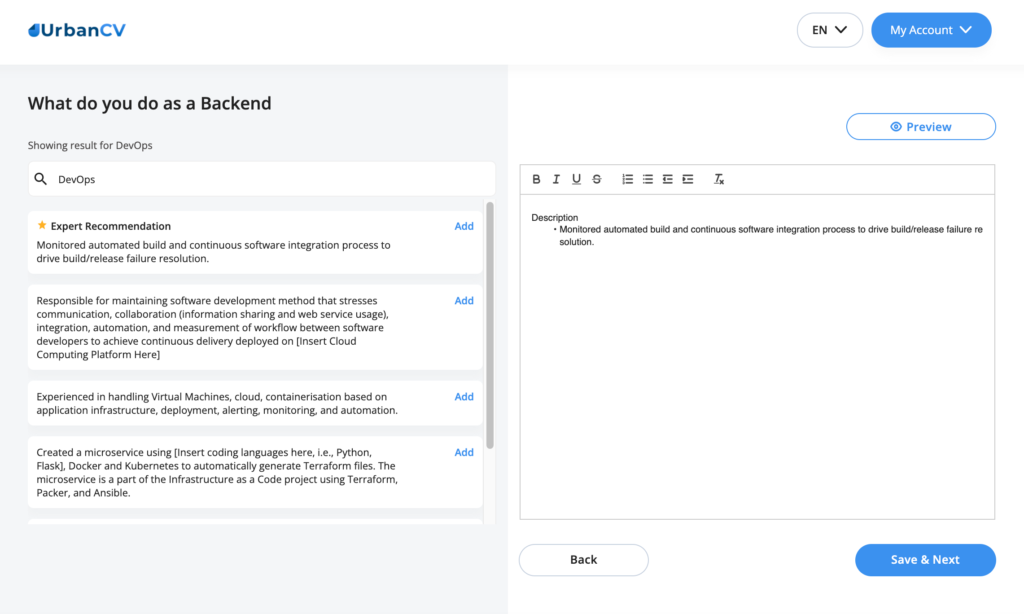For those who are DevOps Engineers or looking to switch into a DevOps career, you probably need to know about how to do up a great CV for a DevOps Engineer.
A “DevOps Engineer” is arguably a new profession in the IT world.
According to AWS, “DevOps is the combination of cultural philosophies, practices, and tools that increases an organization’s ability to deliver applications and services at high velocity: evolving and improving products at a faster pace than organizations using traditional software development and infrastructure management processes.”
In other words, the DevOps Engineer’s role and value lie in maintaining the high speed of a software development process.
In modern software engineering processes, therein lies a problem that the software development team takes longer to deploy and to maintain their backend servers, cloud computing platforms and tech infrastructures.
Even the division of tasks might take too long and the current development bureaucracy slows down the process.
Thus, solutions were conceived to be able to build software and application systems more quickly.
That’s how the role DevOps Engineer appears.
DevOps Engineer itself is a combination of two software development teams – namely the development team (Dev) and the operations team (Ops).
This collaborative approach is carried out in order to achieve effective and efficient results.
That way, the company will get maximum results.
Then, what are the duties of a DevOps Engineer and how to make the right CV and Resume for this position?
This article discusses:
DevOps Engineer Job Description: Roles and Responsibilities

Those of you who are interested in becoming a DevOps Engineer should know what the tasks are.
Knowing what the assignment is will give you a little push to really dive into this world.
A DevOps Engineer is someone who deals with building an automated, integrated, and flexible system infrastructure.
By creating a system infrastructure in such a way, developers will find it easier to launch their coding efficiently.
What does a DevOps Engineer do on a daily basis?
In general, a DevOps Engineer is tasked with building a Containerization or Virtualization system, an automated and integrated infrastructure, and an effective monitoring system.
Judging from the tasks assigned to a DevOps Engineer, what are the responsibilities does the engineer do?
The following are some of the responsibilities that you will carry while becoming a DevOps Engineer:
- Oversee digital architecture (from continuity to compliance)
- Plan for software revolution and IT systems
- Building websites, apps and software snippets (in collaboration with the development team)
- Perform analysis which then uses the analysis results for relevant teams to assist other teams’ work
- Ensure software and systems are activated and run according to schedule (in collaboration with planning team)
- Keeping software and system problems out of the way
- Solve problems that arise with software and systems
- Develop digital infrastructure and work with automated code to increase efficiency and reduce risk
- Forming a framework for software and application deployment
In sum, those of you who want to become a DevOps Engineer must be prepared to take on the roles and responsibilities mentioned above.
Skills of a DevOps Engineer

For those of you who are IT graduates or are software engineers, becoming a DevOps Engineer might be a good career path.
However, if you want to become a qualified and trusted DevOps Engineer, you must have the following skills:
- Source Code Management (Version Control System) eg: Git and Subversion
- Continuous Integration / Delivery Pipelines
- Automation/Integration Tools (Jenkins)
- Major Clouds Services Provider (AWS, Azure, etc.)
- Infrastructure as Code (Programmable Infrastructure)
- Software Containerization Platforms (Docker) and Container Tools (Kubernetes, Docker Swarm)
- Operate Linux-based infrastructure
- Understand the use of Ruby, Python, Perl, and Java as coding languages
- Database Configuration and Management (MySQL, Mongo)
- Troubleshooting and Testing
The skills above are very useful in carrying out the duties of a DevOps Engineer. Therefore, it is important for you to master the skills above.
Recruiters also tend to look at this part of the consideration process. It’s no wonder that applicants with these skills have a higher chance of getting the job offered.
DevOps Engineers’ CV

After knowing all the work assignments, responsibilities, and skills that you must have, are you still interested in becoming a DevOps Engineer?
If you are interested, now is the right time for you to think about creating your CV.
What kind of CV can highlight your qualities as a DevOps Engineer?
Make sure everything you write on your CV is related to the work scope of a DevOps Engineer.
By mentioning related information, your credibility to be considered will be higher.
What should you write on your CV as a DevOps Engineer? And how to write it down?
Let’s see the detailed elaboration below:
1. Profile

Your personal profile information may be one piece of information that you should not miss.
Without this information, recruiters will not be able to process your CV.
Without being processed, you don’t even have a chance to be considered.
No matter how good your CV is.
Write down your complete profile information.
This includes your full name, email address, residential address, as well as a telephone number.
Make sure you write down your title, which means to write down “DevOps Engineer”.
Why do you have to write this down?
This will make your CV targeted with the relevant keywords that highlight themselves to the recruiters.
A CV that contains job information will tell recruiters directly what position you are aiming for.
Generally, the title will be written under your name.
That way, recruiters can easily see this information.
You should place all of these sections at the top of the CV Resume document.
You can also write your long name information with a larger font size than other information.
2. Work Experience

Work Experience is one component that can provide an overview of your abilities in the position offered.
This is to convince recruiters that you are someone qualified to fill the DevOps position offered.
With a proper work experience, you can also convince the hiring party that you know what you need to do.
Here are the things you should mention:
- Workplace
- Job title
- Length of work
- Achievement
3. Education

The education component lists out your educational credentials and achievements. A short note is that for a DevOps Engineer role, usually, the work experience will take a priority interest for the recruiter.
There are two things you should also consider.
First, do you need the space from this section for more important information? For example, you have information about work experiences that require more space.
Because a CV is a document that is preferably one or two pages long, you certainly can’t write down all the information you have.
You have to make sure the information you write down will help you get the job you want.
Therefore, when your experience has a lot of information that takes up a lot of space, you can also replace omitting this section.
Especially if the educational information you have is not related to IT or DevOps Engineer.
Second thing, if you don’t have much experience. Usually when you just graduated from education, you don’t have much work experience.
If that is the case, you can also write down information about your education.
Here are the things you should include in the “Education” section
- Name of educational institution
- Education concentration
- Achievements (GPA scores, rankings)
4. Skills

Another component that can give you an idea of your abilities is to lay out your DevOps skills to the recruiter.
Skills will tell recruiters specifically what you are good in.
Therefore, writing this section is very important.
In the previous section, there were some specific skills that a DevOps Engineer should have.
Make sure you mention these skills.
But remember: Don’t just stick to the list of skills above.
There are many skills you can name in other areas, i.e., the soft skills like leadership and communication
Indeed mentioning IT-related skills is very important.
But writing down general skills can also give you an idea of the nature of your professionalism in the world of work.
Below are some of the most important skillsets of a DevOps Engineer:
- Your core programming knowledge (Python, Java, Ruby, Perl, Go, NodeJS)
- Bash/Shell Scripting: A command processor that is text-based and whereby the user types commands that cause actions.
- Jenkins: Automate the build, test and deploy process of the software development leading to Continuous Integration and Continuous Delivery.
- Ansible: IT Automation by connecting all your software nodes.
- Docker: A containerisation model that packages an application and its dependencies in a virtual container that runs in many key locations, i.e., onsite, cloud, etc.
- Terraform: Infrastructure as a code to provide a consistent CLI workflow to manage cloud services.
- Kubernetes: To automate deployment, scaling, and management of containerized applications.
- Helm Charts: To manage kubernetes applications.
- Ubuntu: Operating system for cloud computing.
- Nginx: A web server that can also be used as a reverse proxy, load balancer, mail proxy and HTTP Cache.
- Cloud Computing Platforms (Amazon Web Services, Google Cloud Platform, Microsoft Azure, Aliyun, IBM Cloud).
The other soft skills you can put in your CV are:
- Leadership
- Problem Resolution and Conflict Resolution
- Language Skills (English, Indonesian, German, etc.)
- Communication
- Critical and detailed analysis
- Flexibility and Adaptability
5. Certifications
If you want to clinch that DevOps job, then your trump card could lie in having DevOps certifications to prove to recruiters that you have the technical skills for the role.
As DevOps demands alot technically from the engineer, companies are usually more inclined to hire those who are backed by their wide array of Devops certifications.
Certificates are generally obtained from the training you take from one of the trusted cloud platforms or educational partners.
Certificates can give you an idea of your ability in a certain area.
And that your ability has been recognised by a trusted institution.
There are two types of certificates, certificates that are valid for life and certificates with an expiration date.
Make sure what you include is a valid certificate.
Writing expired certificates can be detrimental for your CV.
These are some of the most popular DevOps certifications to showcase on your CV:
AWS Certified DevOps Engineer – Professional
The AWS Certified DevOps Engineer – Professional is mainly for those engineers with two or more years of experience in operating in AWS environments.
DevOps Foundation from DevOps Institute
The basic certificate offered by DevOps Institute to kickstart on your DevOps Certification Journey.
DevOps Leader from DevOps Institute
If you are leading a DevOps team or planning to lead one, then this certification is for you to enhance and develop your leadership skills in DevOps.
DevSecOps Foundation from DevOps Institute
The DevSecOps Foundation focuses on security in DevOps, with topics ranging from data breaches, and data privacy regulations.
Awarded by Docker, this certification shows that you are proficient in using Docker to deploy your software applications.
Certified Kubernetes Administrator by Cloud Native Computing Foundation
The certification provides assurance that the Certified Kubernetes Administrator have the skills, knowledge and proficiency to administer Kubernetes.
Certified Kubernetes Application Developer (CKAD) by Cloud Native Computing Foundation
By having this certification, it shows that the engineer can design, build, configure, and expose cloud applications for Kubernetes.
Microsoft Certified: DevOps Engineer Expert
One needs to complete either the Microsoft Certified: Azure Administrator Associate or the Microsoft Certified: Azure Developer Associate course before they can earn this certificate. Holders will be able to demonstrate proficiency in the Microsoft Azure Cloud Computing.
Puppet is used by 40,000 companies worldwide for IT automation so holders of this certificate will find no trouble in getting the right DevOps opportunity.
This certification validates and proves you have the abilities to deploy and execute DevOps operations using the Google Cloud Platform.
Professional Cloud DevOps Engineer
Having this certification can show the abilities to apply site reliability principles to a service, optimise on the performance and build and implement CI/CD operations on Google Cloud.
If you are looking to use Alibaba Cloud in your company, then this certification is for you. It will demonstrates your expertise and proficiency in deploying applications on the Alibaba Cloud.
With the above array of certifications, it will enable you to stand out from amongst your peers when applying for the DevOps role.
6. Other information

If your CV is still sparse, you should add some additional information.
Additional information that you can include is:
Objective Summary
In this section, you can write a paragraph that describes yourself.
Generally, this section is used to be able to provide additional words to convince recruiters to hire you.
Some of the things you can write about in this section are your long-term goals in the DevOps Engineer world, skills to highlight, and so on.
Make sure what you mention in this section is something important.
Generally, you can use this section to explain the points that you feel can highlight your CV.
This section also does not require many sentences.
You just need to use 3 to 4 sentences.
The rest, you can put the explanation in your cover letter.
Achievement
This information is obtained from every achievement you get, from your education to your work experience.
For those of you who have received awards in related fields, you can include them in this section.
How to easily build the Perfect DevOps CV?
Given all that we have shared above, the next step would be to bring together all the ingredients and cook up your perfect DevOps CV and Resume.
How do we do that easily?
The good news is there is a straightforward and easy free tool to build your CV easily.
In UrbanCV, DevOps engineers can easily choose from many free and premium CV templates to get started.
After selecting on the CV, the DevOps Engineer can choose the “DevOps” template to populate the top keywords and copywriting used by successful DevOps candidates

UrbanCV gives you free access to the best copywriting for your work experiences to charm your hiring company and recruiters.

In our 5 years of recruiting and hiring DevOps engineers, we have analysed thousands of DevOps CV and Resumes to only give you the best copywriting that successful DevOps Engineers use to apply for jobs.
For example, if you selected “DevOps”, these are some of the top copywriting you should have in your CV:
- Monitored automated build and continuous software integration process to drive build/release failure resolution
- Experienced in handling Virtual Machines, cloud, containerisation based on application infrastructure, deployment, alerting, monitoring, and automation
- Created an abstraction for the deployment using Helm Charts
- Introduced Ansible as Virtual Machine based automation to provision internal services like Jenkins
All of the above and many more top copywriting are available in your UrbanCV’s DevOps Library.
The best part of all these? UrbanCV is free to get started.
It is free to get started and our premium templates only costs from $5, which is arguably the world’s most affordable and value for money CV builder.
Conclusion
The key step to kickstart your career as a DevOps Engineer is to create a CV.
Your CV must be as attractive as possible to convince recruiters to hire you from a sea of suitable candidates.
Creating a CV requires your attention to many things in order to make the best resume.
By building the best CV, your CV will certainly attract the attention of recruiters.
In writing, you must pay attention to the contents of the CV.
Make sure the contents of your CV are not too crowded or too quiet.
Therefore, you also have to decide which information is appropriate for you to write down. You don’t need to write everything in your CV.
You also need to know what pieces of information are important for you to highlight. More precisely, information that can highlight your qualities as a DevOps Engineer.
UrbanCV is a provider that gives you many options to choose your CV template. With these many options, you can highlight important information in your CV.
















